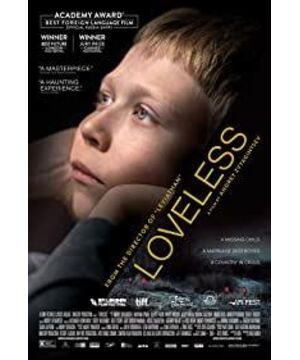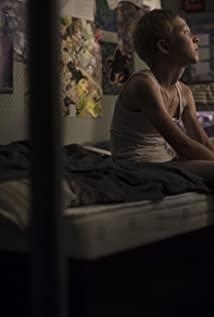"To be honest, I never loved you. Only with you can I finally leave her who has long been unbearable."
Unexpected children, nonexistent marriages
The break between the new life and the old past begins with the departure of an unloved child. The husband and wife are eager to sell the house, the family carrier that exists in name only, and they are also worried about not being able to dispose of their children like a house. There are two houses that symbolize family affection. On the one hand, the red wine lights the kitchen, and the parents quarrel grandly; Alyosha, the boy who was kicked, was placed in a space without consideration, but his appeal for parental love could not be ignored.
In this scene, we can see the contradiction in the behavior of Zhenya and Boris - they want to separate quickly, but they can't make a real break. The reason is not love or kinship, but the boss that a man can't deal with, and the responsibility of raising a child that neither husband and wife want to take on.
One cohabits with a wealthy boyfriend, and the other impregnates his lover's woman. Serious family problems on the surface are actually not the culprits of the quarrel between the hero and heroine. For marriage, more frightening than an extramarital affair is the discovery of the ineffectiveness and meaninglessness of marriage itself. Marriages that shouldn't happen, "love" that shouldn't happen, fathers and mothers that shouldn't be facilitated, and innocent and damaged children. In the family view of Zhenya and Boris, they unconsciously added a negative attitude to their past self-behavior and marriage. Zhenya repeatedly shouted "I never loved you", while Boris used indifference and potential violence. The transfer expresses disdain. The adults quarreled, shied away, and defended themselves, and Alyosha, who did not speak, became the bearer of the fault. For the past, his presence bears witness to the wrong union of his parents. For the present and the future, his presence blocks his parents' path to a new life.
An untimely departure, a search inside and outside the family
The gap between reality and longing for a new life begins with the disappearance of an unloved child. Leaving the quarrel in the room, the couple parted ways to find joy elsewhere. Zhenya is constantly swiping her phone, taking beauty selfies, eager to socialize, dressing up to go to fancy restaurants, and flirting with wealthy men; Boris is living a married life with a cohabiting lover with a big belly. The marriage in name and the attitude of laissez-faire, Zhenya and Boris secretly compare with their fresh days, and neither of them wants to face the unpopular vacant house and the cumbersome child who is "no longer an angel".
When the husband and wife were separated and happy, and when they almost forgot about Alyosha, the child who should not have been born disappeared.
After the habit of complaining and quarreling, Zhenya and Boris began to search frantically. As a result, the departure of the child who was worried that there was nowhere to put it became an opportunity for the divorced couple to join hands again. Families that are about to say goodbye have to get together again in order to say goodbye to the group. Different from other film and television plots, "No Love to Complain" disintegrates the little warmth of this action to nothing. The disappearance of Alyosha, not only can't save anything, but has created a renewed conflict in this family that is on the verge of breaking up. The contradiction lies in the fact that the separation of Zhenya and the others was not because one of them was abandoned by the family, but the common source of both parties who did not need such a family at all. The family members who yearn for relief are not only the indifferent husband and the wife who is addicted to the Internet, but also the children who rush down the stairs after hurriedly finishing breakfast in the morning after the couple's quarrel. How could Alyosha, who was not chosen, want to have such a family.
The accumulated resentment erupted in the long search, followed by the cold long-sighted lens, directly to Zhenya's mother, and traced back to the origin of "Loveless". The mother, who was indifferent to her daughter and grandson, passed on her proud disgust and loss of love to Zhenya, and attached a declaration to express her grievances openly, further intensifying the flames of war that might have been quelled. On the way back, Zhenya broke through the marriage relationship between the two of "use" and "mistake", and used the past to map the future that Boris yearned for.
In the end, Boris drove Zhenya out of the car, and the break was officially externalized, which contributed to the climax of this scene.
Frozen time and space, long-depressed environment
The connection between the old past and the new life ends with everyone who is not loved. Volunteer groups wandered through dilapidated and dilapidated buildings where children played, posting revelations on snow-covered roads and underpasses. Such a powerless way of searching connects the time and space of Alyosha's disappearance, and Zhenya and his wife also felt the numbness of the dead end in the daze of no results.
Obviously do not love but have to struggle to find. The husband and wife are eager to release the pressure accumulated in their hearts. If there is no result, they will continue to be gloomy. Even with their new partner, they can't leave the tired of looking at each other. So Zhenya and Boris cried when they misidentified their children in the morgue, the posters in Alyosha's room torn down by the renovation workers, and the news they saw in their respective families afterward, all formed a mentality for them. the results above.
Anyway, this thing is over. From the dead yellow leaves at the beginning of the film to the white snow at the end, even if the small window of Alyosha's room is breathing, it is impossible to judge the warmth of the room.
For the families of Zhenya and Boris, Alyosha is always just a streamer and the host of demands. His longing and fragility are like a broken streamer wrapped around a branch at the end. Although strong with the wind, he wants to be discovered indefinitely.
Throughout the whole film, every character is scolded, the man is cold, the complicated police system, the frivolous non-single girl, the self-satisfied and confident new tenant. In such an uncaring, hostile environment, it seems like a no-brainer for unloved children to disappear. The film bluntly accuses the vain and greed of women who have obvious contrasts inside and outside the family, and then insinuates that men who are tough on the surface but are actually soft and useless (the police system) are just such loveless, indifferent individuals (marriage), A society that is corrupted from its roots is constructed.
The usual allegorical symbols, the pessimism of the times
Interspersed with current political elements, cold abandoned buildings, trembling water ripples. The director showed the government's exposure and realistic criticism in the previous work "Leviathan", and the same emotional expression of environmental imagery to the extreme, and created the mourning and pessimism that fit the times. Couples who are preparing for divorce have found a suitable new partner, and even a new life. But from the few cold sex scenes in the film, it's hard to feel their love. The seemingly perfect graft of life is just a starter for the film. Wasn't poor, missing Alyosha born from a fresh belly? The arrival of new life, the paving of new life, may not really give hope. And the bright future is actually just an illusion.
People live in crises, and naturally they will continue to create crises. People create dilapidated environments precisely because they have lived in such environments for a long time. Using apocalyptic abandoned scenes and beautifully precise shots, Sarkinsev paints a present-day picture of the Russian family that includes Fit's time, past retrospectives, and tangible allegory. However, it points out that the damage of marriage breakdown to children and the prevalence of social indifference to individuals are not limited to Russia.
Despite the stereotyped type and iconic allegory image, "No Love to Tell" did not give me too many surprises. The film also had a more serious sense of rupture in dealing with the new relationship between the husband and wife and the subsequent plot of finding children. .
But he broke out to us the sullenness sneaking in every problem family, which is enough to cause deeper thinking that spreads to the social level.
View more about Loveless reviews










